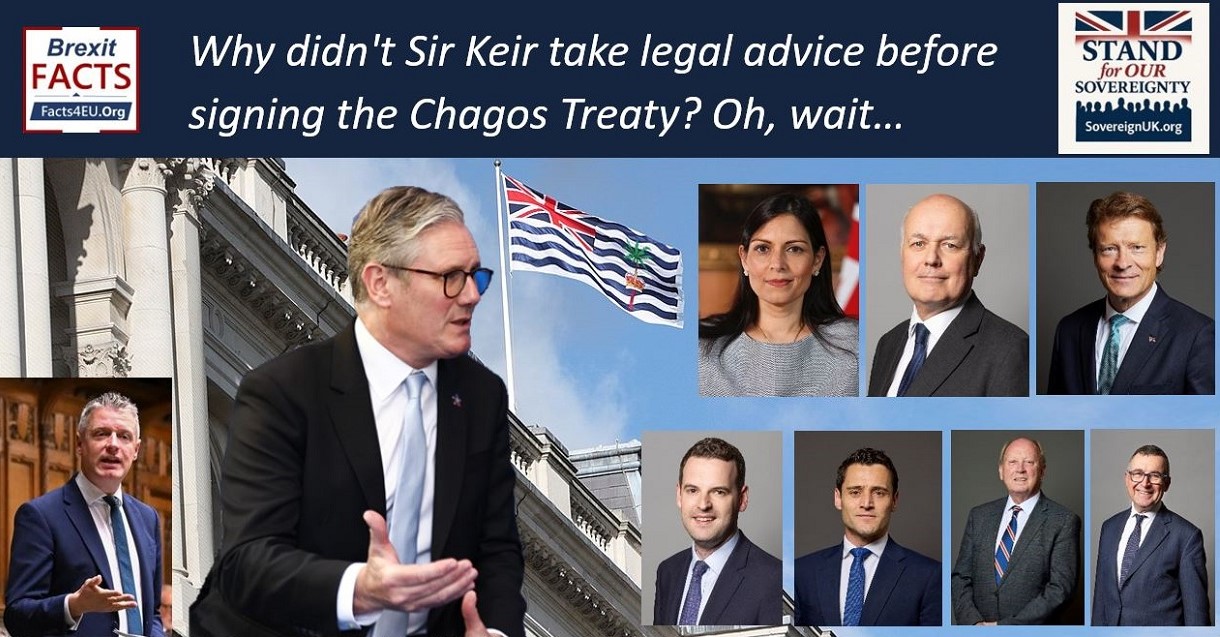Why didn't Sir Keir take legal advice before signing the Chagos Treaty? Oh, wait...
Today we finish our Treaty take-down on grounds of cost, our defence, and a total absence of democratic accountability
Montage © Facts4EU.Org 2025
As for defending our sovereign territory, this seems to be an alien concept to Sir Keir
Facts4EU presents a Stand for Our Sovereignty report which we worked on with them
We began this short Stand for Our Sovereignty (SOS) series on the Chagos surrender with news of a letter from Parliamentarians to President Trump, drawing his attention to aspects of this appalling deal he may not have been told about, because Sir Keir will have wanted them kept quiet when the President’s officials in the Administration were briefed. We followed this yesterday with a summary of the Commons debate on Tuesday.
Our summary effectively destroyed his legal case, which was the basis and reason for the entire Treaty.
The Stand for Our Sovereignty (SOS) team gratefully acknowledges the assistance and advice of Facts4EU, The Campaign for an Independent Britain (CIBUK), the UK Fisheries Campaign, and a number of the country’s most respected senior lawyers and politicians.
Finally today, we look at the other issues arising, which include:
- The exorbitant costs – Who is right and how much? £3.5bn, £35bn? Even £47bn?
- On transparency and the Democratic Deficit – the ‘Killer Clause V’ you will not believe
- On the implications for British sovereignty generally
- On operational interference in military usage
- On China, Russia and Iran – and on our allies, especially Trump’s USA
- On what happens after 99 years
1. The exorbitant costs
The position of Sir Keir Starmer’s Government
The headline figure the Government want the public to hear is £3.4 billion. Even this very large amount of money is grossly understated, however. Nevertheless, this is what the mid-level Minister the Government put up to present its case said:
“We have heard some outrageous claims artificially boosting the costs of this deal. It will cost an average of £101 million per year in today’s money. That is an investment in today’s money of £3.4 billion over 99 years. That has been rigorously calculated, based on net present value, the methodology endorsed by the Government Actuary’s Department and the Office for Budget Responsibility. All the associated costings have been laid previously before the House and were explained in full at the time of signature.”
“We calculated our figures based on the Green Book, and that is why we are confident in them.”
- Luke Pollard MP, Minister of State for Defence Readiness and Industry, Commons, 09 Sept 2025

The position of the Opposition parties
The simple fact is that the taxpayer will end up paying the Mauritian government a great deal more than £3.4 billion. The Opposition are using the figure of £35 billion, which is what the Government’s own Actuary and Office for National Statistics would use. The Taxpayers Alliance has just published its own figures which come to £47 billion. The Government has used a figure calculated using methods known as ‘net present value’, ‘deflators’, and the ‘social time preference rate’. They justify this by saying that these are the methods used in the ‘Green Book’ – which purportedly shows the amounts the Government will spend.
The problem with this is that such methods are only used for domestic spending, where costs can be controlled and where reasonable assumptions can be made about effects such as inflation. As this is a long-term commitment, they have also applied a formula which says that money ‘invested’ now has a greater value to the public than money invested in the future, as the benefits accrue earlier.
As several MPs pointed out, however, the Government’s methods have only ever been used for domestic spending, not for paying off some foreign government where the variables applied to the figures are outside the control of the UK Government. Whilst the Minister continually referred to the Green Book as if it were the Bible, it is not applicable for cases such as the ransom payments to Mauritius. Here is a typical example: “We calculated our figures based on the Green Book, and that is why we are confident in them.” (Luke Pollard, Government Minister.)
Readers will be familiar with the term ‘creative accounting’. To employ a current colloquialism, the Government’s cost calculations are like ‘creative accounting on steroids’. Here are some of the best contributions from Opposition MPs. The only additional points we would make is that this money can hardly be described as an investment. In our view it is more akin to a blackmail payment, spread over the next 99 years, but front-end loaded.
“The Minister challenged the Opposition and the shadow Chancellor about our position on net present value, but the reason is that the use of NPV is unprecedented. It is used for commercial deals that the Government make and is standardised for that alone, not for international agreements on sovereignty. Does my right hon. Friend agree that we will not change on net present value, which has its place in commercial deals but not in giving away sovereignty?”
- Dr Luke Evans MP (Cons)
“My hon. Friend is absolutely right; it is absolutely shameful.”
- Dame Priti Patel MP, Shadow Foreign Secretary

“Just to settle this whole argument about net present value, the reason it simply cannot be used for a long-term treaty obligation is that it is necessary to make a really heavy estimation of what will happen socially and economically in that area. It is just about possible to use some of that in the UK, where the Government control certain aspects, which they will not control after this treaty is signed. That is why it has been recommended that it not be used for long-term effects when not within the UK. That is why the actuarial department advised going for the total amount, not this net present value.”
- Sir Iain Duncan Smith MP
“My right hon. Friend is absolutely correct.”
- Dame Priti Patel MP, Shadow Foreign Secretary

Crucially, the Bill presented to Parliament actually excludes the costs. Parliament has never been given an opportunity to debate and approve them. This in itself is irregular.
“The Bill represents a series of measures, not the treaty in its entirety. The Government blocked this House from voting on the treaty during the 21-day process provided for in the Constitutional Reform and Government Act 2010. … As the explanatory notes to the Bill confirm, the Bill will not authorise expenditure. That is not acceptable.”
“Let us be clear: unless there is a direct vote on the costs, Labour will have cheated Parliament and Britain out of having a say on the financial implications of the £35 billion that British taxpayers are being forced to pay a foreign Government. That expenditure means higher taxes for British taxpayers and less spending for British people across all constituencies around the country.…. If they need to check that with Rachel from accounts or Lord Hermer, I am sure they can do so before the end of the debate. Labour giving away British taxpayers’ money to a foreign Government to rent land that we already own is reckless and irresponsible.”
- Dame Priti Patel MP, Shadow Foreign Secretary
The best explanation of this whole issue came from IDS.
“Let me remind the Government of the problem with what they call the GDP deflator and the so-called social time discounting method. The Government Actuary’s Department has dismissed that as a real way of calculating cost for this kind of issue, and it has re-emphasised the fact that understanding the total cost is the only way to look at a long-term treaty.… Add to that the fact that the Government are trying to predict what will happen in Mauritius, under the Mauritian Government, over the next many years. This is a 99-year deal, and there is no way on earth that we have any control.”
“It is interesting that after not answering the question for so long, suddenly the Government have popped up with a new device. They say that if we do not accept the figures, we are completely dismissing the Green Book, but the overall cost is not a Green Book issue, because this is about paying somebody money outside the UK, not about controlling cost. That is why the Green Book has never been used for this purpose before, and never will. I simply say to the Government that the money side of this has fallen apart again.”
- The Rt Hon Sir Iain Duncan Smith MP
Finally, an important point by Reform’s Deputy Leader.
“The Minister described the deal as an investment. Does the right hon. Lady agree that it would be helpful to educate him that a freehold is an investment and a lease is a liability?”
- Richard Tice MP, Deputy Leader, Reform UK
“Exactly right. On top of that, there is the whole issue of the liabilities, costs and everything else that goes with it. The hon. Gentleman makes a fundamental, important point.”
- Dame Priti Patel MP, Shadow Foreign Secretary

2. On transparency and the Democratic Deficit – the ‘Killer Clause V’ you will not believe
On transparency - It is astonishing what was revealed, not by Sir Keir, but by his opposite number in Mauritius.
“The Prime Minister of Mauritius has said that only the Prime Ministers of our respective countries were in the room; officials were asked to leave the room, so there are no records of what was discussed. Is that how a responsible, democratic Government should show transparency when negotiating on the international stage?”
- Paul Holmes MP
“My hon. Friend is absolutely right; at the heart of this is transparency about negotiations, including fiscal negotiations”.
- Dame Priti Patel MP, Shadow Foreign Secretary

The ‘Killer Clause V’ you will not believe - Next we come to a clause of the Chagos Treaty which almost defies belief. In effect, this clause makes the entire debate – and all other debates on this matter – completely irrelevant. Once again, The Rt Hon Sir Iain Duncan Smith MP sums it up. This is followed by Richard Tice who makes another important point.
“Clause 5 of the Bill, which is a very flimsy document, is entitled “Further provision: Orders in Council”. Anybody who reads that will have a sudden intake of breath. The whole point of this Bill is negated by clause 5. What is the point of debating the rest of the Bill, given that clause 5 says that at any stage, and under any circumstances, the Government can change it all by Orders in Council? Absolutely everything can be changed by Orders in Council, with no vote and no dispute. If the Government decide to go in a different direction, they do not have to consult Parliament any more.
“The sweeping powers in the Bill are ridiculous. When the Minister was in opposition, he used to spend his whole time moaning—quite rightly—about Governments who give themselves such powers. Even by the standards of previous Governments, this Bill is pretty astonishing. It is a massive sweep. This is not really democracy any more; it is monocracy. In other words, we have given up debate and dispute, and we have handed things over to one person—the Prime Minister. I say to the Government that the Bill is appalling, and they really need to rethink it. We simply cannot go through with something as appalling as this. I can remember the Maastricht debates, and various others in which we spent a long time debating clauses on the Floor of the House. That was the right thing to do, because such issues are important. International treaties are vital to our wellbeing, and the Bill simply does not work.”
Clause V actually grants the Government the power to “make any provision that appears to his Majesty to be appropriate as a result of the Treaty”, and this can happen without recourse to Parliament. It means absolutely anything can be changed, once the Treaty has been ratified.
Finally, another example of this Government’s flagrant disregard for transparency and Parliamentary democracy is the fact that the important scrutiny of the Defence and Intelligence Committee has been completely bypassed.
“We have heard today that this deal—this supposed investment that is actually a liability—is essential to the defence of our realm. Yet the Defence Committee has not studied that investment or liability. I think the British people have a right to know why not.”
- Richard Tice MP (Reform UK)
3. On the implications for British sovereignty generally
“It tells us something about Labour’s priorities that within days of coming into office, the Prime Minister met the then Prime Minister of Mauritius to commit to the surrender deal. Encouraged by the Prime Minister’s obsession with left-wing activism and distorted views of international law, and advised by one of the Prime Minister’s best friends and supporters—one could even say his cheerleader—Mauritius knew it was on to a winner negotiating with this naive, foolish and Britain-hating Labour Government. True to form, instead of standing up for Britain’s interests, Labour rushed to accept the advisory opinion of a foreign court that few had heard of, and swiftly agreed to Britain’s surrender of sovereignty.”
- Dame Priti Patel MP, Shadow Foreign Secretary
Please help us to keep going with a donation today. We rely wholly on patriotic members of the public to survive. And/or, please consider joining Stand for our Sovereignty. The more Members they have, the louder their voice in Westminster!
Don't leave this to someone else. You are that 'someone else'.
4. On operational interference in military usage
This is an issue not only important to British military interests, but to those of the U.S., as we pointed out in the first report in this short series.
“The surrender of sovereignty means that Britian [sic] will be a rule taker, taking the laws, rules and commands of Mauritius, and that restricts and impedes base operations. For example, Mauritius has signed up to the Pelindaba treaty, banning the stationing and storage of nuclear weapons; no Minister has been able to provide a definitive answer when questioned about how that may impact our security and defence, once the UK is no longer sovereign in, or able to exercise sovereign rights over, the Chagos islands and Diego Garcia.
“Under the terms of the treaty, we are bound to notify Mauritius of various activities relating to our use of the base, including operations from the base against that country, and movements of our allies’ vessels. Despite heavy questioning, at no point have Ministers explained in detail how the notifications will work, and who will have access to the information.”
- Dame Priti Patel MP, Shadow Foreign Secretary
“The shadow Foreign Secretary is coming to the nub of the matter. This is about the future security of the world, including the United Kingdom. We are arriving at a situation where the sovereign power is a signatory to an empty nuclear treaty that prohibits the stationing of nuclear weapons anywhere within the ambit of the countries that are signatory to that treaty. How could we even use this base for our nuclear submarines?
- Jim Allister KC MP. Leader of the TUV
“The hon. and learned Member is absolutely right. That is why it was important to have a debate on the Floor of the House when the treaty came together, but we did not have one. The treaty brings into question everything about security, including our ability to be as strong and secure as we need to be.”
- Dame Priti Patel MP, Shadow Foreign Secretary

“On the previous question of how much operational independence we will really have, can my right hon. Friend comment on point 4 of annex 1 of the agreement, entitled “Mauritian Security Review”, which requires us to consult Mauritius before any ‘construction or emplacement of any maritime installation’ or ‘any proposal for development in the land territory of the Chagos archipelago’?
“It also states that Mauritius shall conduct a security review, and that our permission to carry out works is dependent on the outcome of the Mauritius security review. We do not have operational independence under this treaty. It then goes through the dispute process, and there is no decisive way of deciding anything unless there is agreement between the two Prime Ministers. It is a completely inadequate agreement.”
- Sir Bernard Jenkin MP

5. On China, Russia and Iran – and on our allies, especially Trump’s USA
Does anyone seriously believe that Russia, with its preoccupations in Ukraine, is suddenly interested in conducting ‘marine research’ thousands of miles from its shores, and so close to a key military base for UK and US forces? Yet it now has an agreement in place with Mauritius to do just that.
“It will come as no surprise to Members to hear that now that our sovereignty over the base is being surrendered, our enemies are queuing up to - guess what? - make friends with Mauritius. Just days before the surrender treaty was signed, Russia agreed a new partnership agreement with Mauritius that includes marine research. That so-called “marine research” conducted by Russia could take place just a handful of miles away from our base. Mauritius has also been courted extensively by Iran and China for further partnerships in a range of other areas. Despite the warnings, this inept Labour Government have failed to act to safeguard our interests.”
- Dame Priti Patel MP, Shadow Foreign Secretary
On China and Iran
“On 4 and 11 June in the House, he said that the treaty ‘has been opposed by our adversaries, Russia, China and Iran’. We know that 6,000 miles away, at the celebration party press conference in Mauritius, China was singled out by the Mauritian Government for praise. According to the press release, Deputy Prime Minister Paul Bérenger noted that China’s ‘unwavering support played a critical role in the international recognition of Mauritian sovereignty.’
“A few days later, the Chinese ambassador issued Mauritius with “massive congratulations” on securing the surrender of the Chagos islands. This summer, the Mauritian Government published a press release saying that the President expressed “gratitude” for China’s “unwavering support” for Mauritius’s sovereignty claim over the Chagos archipelago.
“Iran has also been supportive of the Mauritian claim for the Chagos islands, with its ambassador saying earlier this year: ‘The Islamic Republic of Iran has always supported Mauritius’s position regarding the Chagos issue. So, Chagos belongs to the Mauritian people. We support its return and have made many efforts in the past toward that goal.’”
- Dame Priti Patel MP, Shadow Foreign Secretary
And finally, here is IDS on China.
“There is no way on earth that China does not benefit from this Bill. China has its eyes on the very important flow of commercial Traffic that runs just below the Chagos islands, which it has always wanted to be able to block, control or interfere with.
“The Chinese already have a naval base in Sri Lanka, which they got by default on the back of the belt and road initiative, due to non-payment. For a long time, they have been looking at how, under their arrangements with Mauritius, they will eventually be able to intervene. They are two or three steps further forward as a result of this Bill. It does not secure us against that absolutely, because we gave up absolute security and control when we decided to hand over sovereignty to Mauritius.”
- Sir Iain Duncan Smith MP
6. Finally, what happens after 99 years? What are we leaving our great-grandchildren?
“The Minister has made it absolutely apparent that this is about the long-term security of the base, so could he explain why, under article 13, if after 99 years the Mauritians decide not to negotiate, the base will just stop. We will get first refusal, but we can easily see that the Chinese would outbid us because we in this country decide that that is not affordable. We are a hostage to fortune, and that base will crumble. He has not secured the base, he has just deferred the issue by four generations, and this House will then have to decide what to do.”
- Dr Luke Evans MP
“…that offer will mean - as he describes it, in four generations’ time - there is a decision for this House to take about what it wants to do based on the circumstances at the time.”
- Luke Pollard MP. Government Minister

It is our considered view that this supposed Treaty will not last for much more than 10-15 years.
Observations
Our apologies for publishing later than usual, due to shortage of resources. We will add our observations shortly.
Please, please help us to carry on our vital work in defence of independence, sovereignty, democracy and freedom by donating today. Thank you.
[ Sources: House of Commons Hansard ] Politicians and journalists can contact us for details, as ever.
Brexit Facts4EU.Org, Fri 12 Sept 2025
Click here to go to our news headlines
Please scroll down to COMMENT on the above article.
And don't forget actually to post your message after you have previewed it!
Since before the EU Referendum, Brexit Facts4EU.Org
has been the most prolific researcher and publisher of Brexit facts in the world.
Supported by MPs, MEPs, & other groups, our work has impact.
We think facts matter. Please donate today, so that we can continue to ensure a clean Brexit is finally delivered.
Paypal Users Only - Choose amount first
Quick One-off
Monthly





Something to say about this? Scroll down for reader comments